Person-Centred Care Processes: Principles, Identification and Actions
VerifiedAdded on 2020/10/05
|5
|758
|158
Report
AI Summary
This report provides a comprehensive overview of person-centred care processes, also known as healthcare rights. It defines these processes as approaches that treat individuals with respect and dignity. The report details the principles of person-centred care, including preferences, care integration, information, physical comfort, emotional support, family support, transition, and access. It explains how individuals can identify if they are receiving patient-centred care by evaluating their involvement in decision-making and the provision of information. The report also outlines actions to be taken when person-centred care is unsatisfactory, such as communicating with healthcare professionals and making complaints to relevant health service centers or commissioners. The report concludes with a list of references, including books and journals that support the concepts discussed.
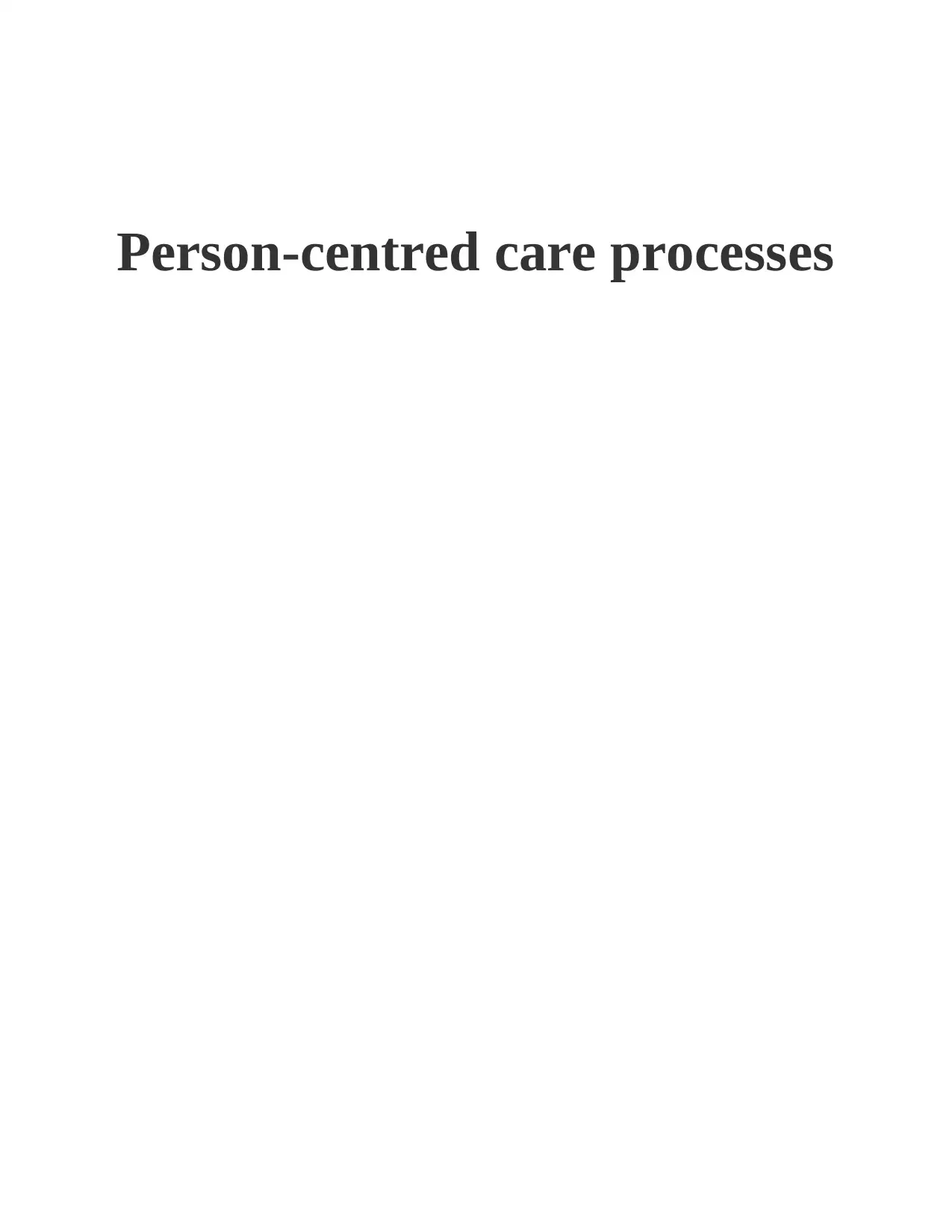
Person-centred care processes
Paraphrase This Document
Need a fresh take? Get an instant paraphrase of this document with our AI Paraphraser
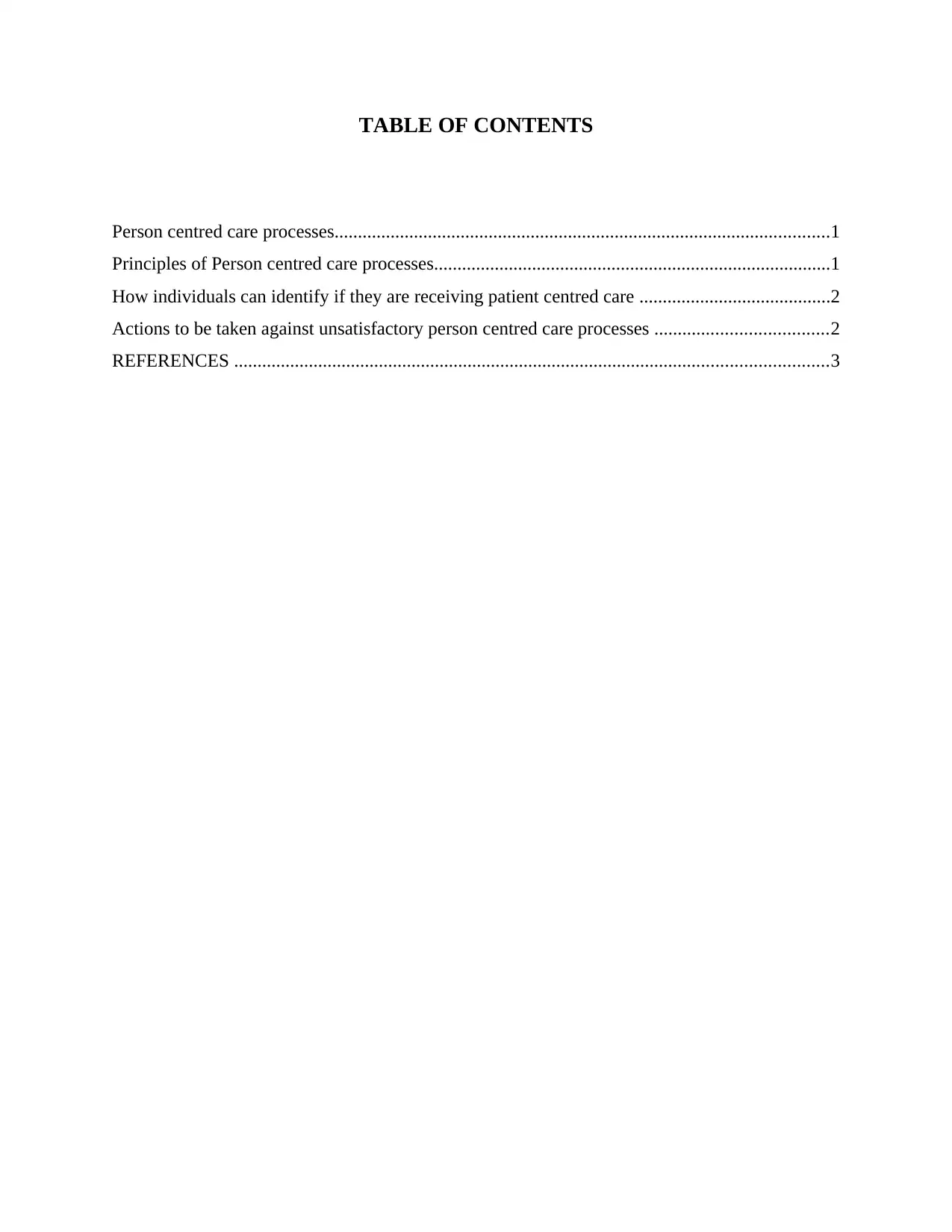
TABLE OF CONTENTS
Person centred care processes..........................................................................................................1
Principles of Person centred care processes.....................................................................................1
How individuals can identify if they are receiving patient centred care .........................................2
Actions to be taken against unsatisfactory person centred care processes .....................................2
REFERENCES ...............................................................................................................................3
Person centred care processes..........................................................................................................1
Principles of Person centred care processes.....................................................................................1
How individuals can identify if they are receiving patient centred care .........................................2
Actions to be taken against unsatisfactory person centred care processes .....................................2
REFERENCES ...............................................................................................................................3
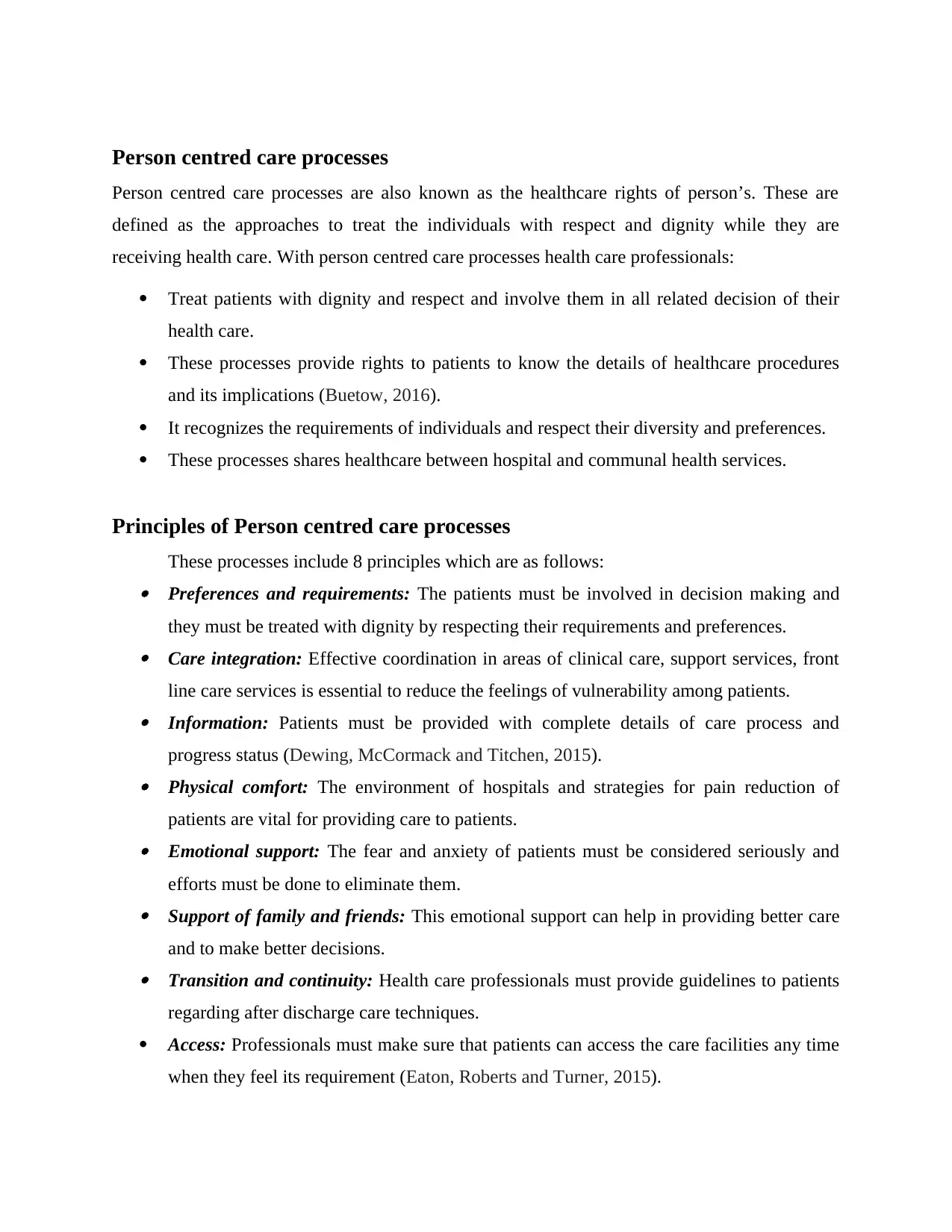
Person centred care processes
Person centred care processes are also known as the healthcare rights of person’s. These are
defined as the approaches to treat the individuals with respect and dignity while they are
receiving health care. With person centred care processes health care professionals:
Treat patients with dignity and respect and involve them in all related decision of their
health care.
These processes provide rights to patients to know the details of healthcare procedures
and its implications (Buetow, 2016).
It recognizes the requirements of individuals and respect their diversity and preferences.
These processes shares healthcare between hospital and communal health services.
Principles of Person centred care processes
These processes include 8 principles which are as follows: Preferences and requirements: The patients must be involved in decision making and
they must be treated with dignity by respecting their requirements and preferences. Care integration: Effective coordination in areas of clinical care, support services, front
line care services is essential to reduce the feelings of vulnerability among patients. Information: Patients must be provided with complete details of care process and
progress status (Dewing, McCormack and Titchen, 2015). Physical comfort: The environment of hospitals and strategies for pain reduction of
patients are vital for providing care to patients. Emotional support: The fear and anxiety of patients must be considered seriously and
efforts must be done to eliminate them. Support of family and friends: This emotional support can help in providing better care
and to make better decisions. Transition and continuity: Health care professionals must provide guidelines to patients
regarding after discharge care techniques.
Access: Professionals must make sure that patients can access the care facilities any time
when they feel its requirement (Eaton, Roberts and Turner, 2015).
Person centred care processes are also known as the healthcare rights of person’s. These are
defined as the approaches to treat the individuals with respect and dignity while they are
receiving health care. With person centred care processes health care professionals:
Treat patients with dignity and respect and involve them in all related decision of their
health care.
These processes provide rights to patients to know the details of healthcare procedures
and its implications (Buetow, 2016).
It recognizes the requirements of individuals and respect their diversity and preferences.
These processes shares healthcare between hospital and communal health services.
Principles of Person centred care processes
These processes include 8 principles which are as follows: Preferences and requirements: The patients must be involved in decision making and
they must be treated with dignity by respecting their requirements and preferences. Care integration: Effective coordination in areas of clinical care, support services, front
line care services is essential to reduce the feelings of vulnerability among patients. Information: Patients must be provided with complete details of care process and
progress status (Dewing, McCormack and Titchen, 2015). Physical comfort: The environment of hospitals and strategies for pain reduction of
patients are vital for providing care to patients. Emotional support: The fear and anxiety of patients must be considered seriously and
efforts must be done to eliminate them. Support of family and friends: This emotional support can help in providing better care
and to make better decisions. Transition and continuity: Health care professionals must provide guidelines to patients
regarding after discharge care techniques.
Access: Professionals must make sure that patients can access the care facilities any time
when they feel its requirement (Eaton, Roberts and Turner, 2015).
⊘ This is a preview!⊘
Do you want full access?
Subscribe today to unlock all pages.

Trusted by 1+ million students worldwide
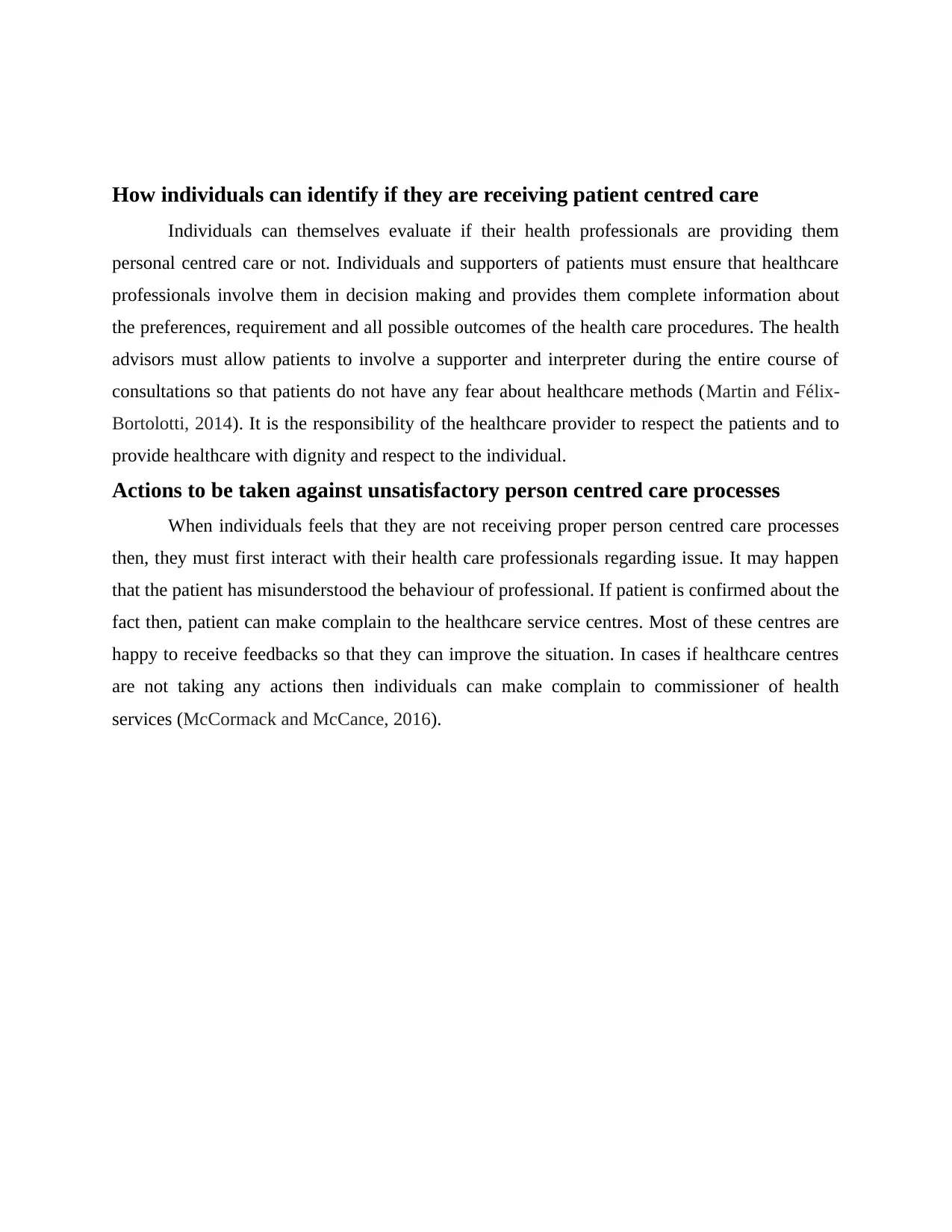
How individuals can identify if they are receiving patient centred care
Individuals can themselves evaluate if their health professionals are providing them
personal centred care or not. Individuals and supporters of patients must ensure that healthcare
professionals involve them in decision making and provides them complete information about
the preferences, requirement and all possible outcomes of the health care procedures. The health
advisors must allow patients to involve a supporter and interpreter during the entire course of
consultations so that patients do not have any fear about healthcare methods (Martin and Félix‐
Bortolotti, 2014). It is the responsibility of the healthcare provider to respect the patients and to
provide healthcare with dignity and respect to the individual.
Actions to be taken against unsatisfactory person centred care processes
When individuals feels that they are not receiving proper person centred care processes
then, they must first interact with their health care professionals regarding issue. It may happen
that the patient has misunderstood the behaviour of professional. If patient is confirmed about the
fact then, patient can make complain to the healthcare service centres. Most of these centres are
happy to receive feedbacks so that they can improve the situation. In cases if healthcare centres
are not taking any actions then individuals can make complain to commissioner of health
services (McCormack and McCance, 2016).
Individuals can themselves evaluate if their health professionals are providing them
personal centred care or not. Individuals and supporters of patients must ensure that healthcare
professionals involve them in decision making and provides them complete information about
the preferences, requirement and all possible outcomes of the health care procedures. The health
advisors must allow patients to involve a supporter and interpreter during the entire course of
consultations so that patients do not have any fear about healthcare methods (Martin and Félix‐
Bortolotti, 2014). It is the responsibility of the healthcare provider to respect the patients and to
provide healthcare with dignity and respect to the individual.
Actions to be taken against unsatisfactory person centred care processes
When individuals feels that they are not receiving proper person centred care processes
then, they must first interact with their health care professionals regarding issue. It may happen
that the patient has misunderstood the behaviour of professional. If patient is confirmed about the
fact then, patient can make complain to the healthcare service centres. Most of these centres are
happy to receive feedbacks so that they can improve the situation. In cases if healthcare centres
are not taking any actions then individuals can make complain to commissioner of health
services (McCormack and McCance, 2016).
Paraphrase This Document
Need a fresh take? Get an instant paraphrase of this document with our AI Paraphraser
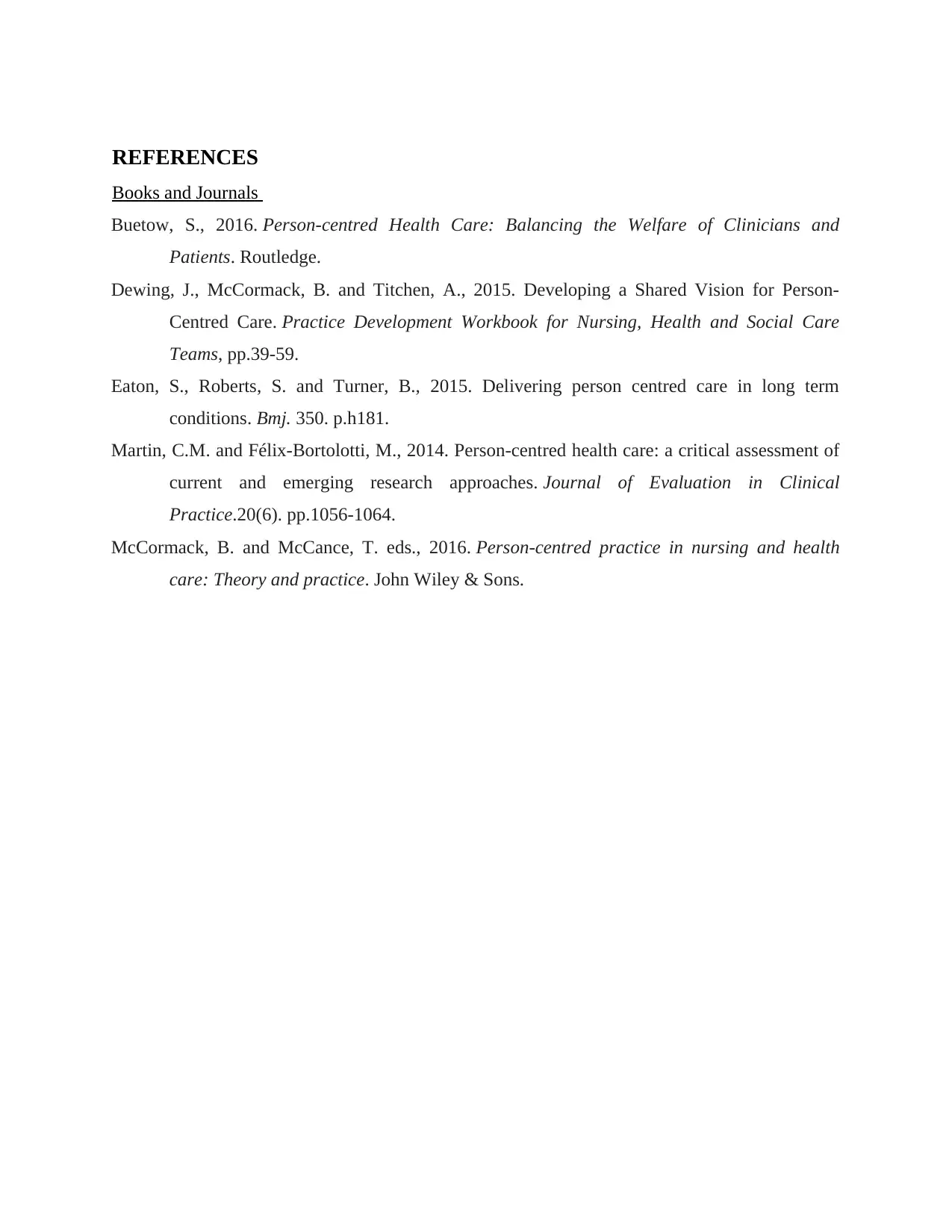
REFERENCES
Books and Journals
Buetow, S., 2016. Person-centred Health Care: Balancing the Welfare of Clinicians and
Patients. Routledge.
Dewing, J., McCormack, B. and Titchen, A., 2015. Developing a Shared Vision for Person‐
Centred Care. Practice Development Workbook for Nursing, Health and Social Care
Teams, pp.39-59.
Eaton, S., Roberts, S. and Turner, B., 2015. Delivering person centred care in long term
conditions. Bmj. 350. p.h181.
Martin, C.M. and Félix‐Bortolotti, M., 2014. Person‐centred health care: a critical assessment of
current and emerging research approaches. Journal of Evaluation in Clinical
Practice.20(6). pp.1056-1064.
McCormack, B. and McCance, T. eds., 2016. Person-centred practice in nursing and health
care: Theory and practice. John Wiley & Sons.
Books and Journals
Buetow, S., 2016. Person-centred Health Care: Balancing the Welfare of Clinicians and
Patients. Routledge.
Dewing, J., McCormack, B. and Titchen, A., 2015. Developing a Shared Vision for Person‐
Centred Care. Practice Development Workbook for Nursing, Health and Social Care
Teams, pp.39-59.
Eaton, S., Roberts, S. and Turner, B., 2015. Delivering person centred care in long term
conditions. Bmj. 350. p.h181.
Martin, C.M. and Félix‐Bortolotti, M., 2014. Person‐centred health care: a critical assessment of
current and emerging research approaches. Journal of Evaluation in Clinical
Practice.20(6). pp.1056-1064.
McCormack, B. and McCance, T. eds., 2016. Person-centred practice in nursing and health
care: Theory and practice. John Wiley & Sons.
1 out of 5
Related Documents
Your All-in-One AI-Powered Toolkit for Academic Success.
+13062052269
info@desklib.com
Available 24*7 on WhatsApp / Email
![[object Object]](/_next/static/media/star-bottom.7253800d.svg)
Unlock your academic potential
Copyright © 2020–2026 A2Z Services. All Rights Reserved. Developed and managed by ZUCOL.




